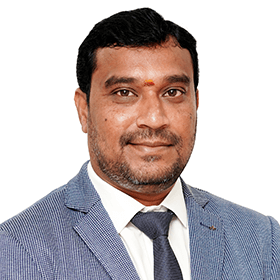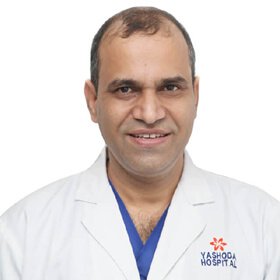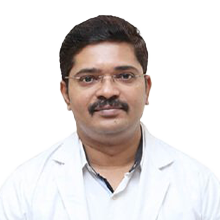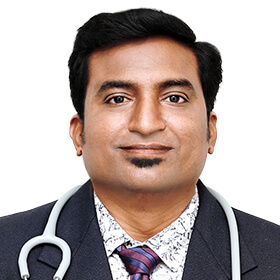Best Hospital For Varicose Veins Treatment In Hyderabad, India
- 25+years of Experienced Vascular Surgeons
- Advanced Laser & Super Glue Techniques
- Minimally Invasive Varicose Veins Treatment
- 45-Minute Advanced Surgical Procedure
- Single Day Discharge & Faster Return to Routine
- Dedicated Patient Care & Insurance Assistance
What are varicose veins?
Varicose veins are twisted, dilated veins most commonly located on the lower extremities. They are part of chronic venous disorders ranging from fine telangiectasias, also called spider veins (less than 1 mm), to reticular veins (larger presentation). Associated with these prominent veins, there may be the presence of edema, hyperpigmentation, and venous ulcers if left untreated.
What are the treatment options available for varicose veins?
There are two types of treatments available for varicose veins: conservative and interventional treatment options.
1. Conservative Treatment Methods
options include external compression; lifestyle modifications, such as avoidance of prolonged standing and straining; exercise; wearing nonrestrictive clothing; modification of cardiovascular risk factors; elevation of the affected leg; weight loss; and medical therapy.
2. Interventional Treatment Methods:
Yashoda Hospital has the most advanced and minimally invasive techniques for the treatment of varicose veins making it the Best Varicose Veins Treatment Hospital in Hyderabad.
a) Super Glue Technique for Varicose Veins:
In this type of conservative intervention, a medical-grade glue is used to seal the main saphenous vein in the thigh. Once the vein has been glued and sealed, it undergoes a process of hardening (sclerosis) and is gradually absorbed into the body.
Procedure for Super Glue Technique:
- The procedure involves the placement of a very small amount of medical-grade vein glue into the vein through a small catheter.
- Once the affected vein is closed, blood is immediately re-routed through other healthy veins in the leg.
- This procedure does not involve the requirement of a regional nerve block or large volumes of anaesthesia.
- Patients can return to their normal activities right after the treatment.
- Unlike heat-based treatments, no risk of skin burns or nerve damage
- No need of post-procedural stocking compression.
b) Thermal Ablation
Thermal ablation destroys damaged veins using an external laser or via endovenous catheter using a laser (endovenous laser ablation, EVLA) or radio waves (radiofrequency ablation, RFA). External laser thermal ablation works best for telangiectasias. In this therapy, hemoglobin absorbs the laser light, leading to thermocoagulation.
Thermal Ablation Procedure
- Endovenous thermal ablation is recommended as first-line treatment for non-pregnant patients with symptomatic varicose veins.
- Endovenous thermal ablation is performed after a local anesthetic is injected around the vein.
- Under ultrasound guidance, a laser optical fiber or radiofrequency catheter electrode is inserted into the vein in a distal to proximal direction.
- Heat from the laser or radio waves coagulates the blood in the vein, resulting in closure of the vein and redirection of blood flow to functional veins.
- Patients can walk after the procedure and may be discharged home the same day.
c) Endovenous Sclerotherapy:
Endovenous sclerotherapy involves using ultrasound guidance to inject superficial veins with an agent that causes inflammation of the endothelium, resulting in fibrosis and occlusion in the vein.
Endovenous Sclerotherapy Procedure:
- Sclerotherapy is typically used for small (1 to 3 mm) and medium (3 to 5 mm) veins or to treat recurrent varicose veins after surgery
- A needle is inserted into the vein lumen and the sclerosing agent is injected, often with air to create a foam.
- The foam displaces the blood and reacts with the vascular endothelium, sealing and scarring the vein.
d) Surgery:
Surgery for varicose veins involves surgery with ligation and stripping of the great or small saphenous vein. This type of open surgery is now obsolete and is primarily referenced for historical and academic purposes, with no longer being a standard treatment for varicose veins.
Advantages of Minimally Invasive Varicose Veins Surgery
| Features | Conventional/Open Surgery | Advanced/Minimally Invasive (Laser) |
| Technology | OUTDATED | ADVANCED |
| Pain | High | Minimum |
| Blood Loss | More | Very Minimal |
| Hospital Duration | Long | Single Day |
| Recovery | Slow | Fast |
| Cuts & Stitches | More | Nil |
| Scars | Yes | No |
| Follow Up | Required | Not Necessary |
Why Choose Yashoda Hospitals for Varicose Veins Treatment?
- Dedicated specialised endovascular surgeons
- Most advanced minimally invasive treatment options
- Minimal post operative complications
- Most aesthetic treatment outcomes
- Single Day Discharge
What are the causes of varicose veins?
Though there is no one specific cause for varicose veins, the presence of these veins is common in a few conditions, like prolonged standing, and usually resolves when patients sit and elevate their legs and Women are significantly more likely than men to report lower limb symptoms.
What are the common symptoms of varicose veins?
Symptoms consist of aching, heaviness, cramping, throbbing, restlessness, and swelling in the legs. Symptoms are often worse at the end of the day, especially after prolonged standing, and usually resolve when patients sit and elevate their legs.
Who is at a greater risk of developing varicose veins?
- Those who have a family history of venous disease
- Females are more prone to varicose veins than men
- More commonly seen in the older age group
- In cases where there is chronically increased intra-abdominal pressure due to obesity, pregnancy, chronic constipation, or a tumour; and prolonged standing.
Meet Our Varicose Veins Specialists

Dr. Ranjith Kumar Anandasu
22 Years Of Experience
Consultant Vascular and Endovascular Surgeon

Dr. Devender Singh
21 Years Of Experience
Consultant Vascular and Endovascular Surgeon

Dr. Prabakar D
15 Years Of Experience
Consultant Vascular and Endovascular Surgeon

Dr. S Srikanth Raju
6 Years Of Experience
Sr. Consultant Vascular & Endovascular Surgeon, Foot Care
FAQ’s
Are varicose veins dangerous?
In majority of situations,varicose veins are not life-threatening, but untreated varicose veins can lead to pain, ulcers, blood clots (deep vein thrombosis – DVT), or skin changes.
Can varicose veins get better by themselves?
No, varicose veins do not go away on their own. Without treatment, they may worsen over time, leading to increased pain, swelling, skin discoloration, and, in severe cases, ulcers or blood clots. However, lifestyle changes like exercise, leg elevation, compression stockings, and weight management can help manage symptoms and prevent progression.
Is varicose vein treatment painful?
With recent advancements like superglue techniques and advanced ablation methods, varicose vein treatment is now needle-free, stitch-free, and scar-free. These painless procedures require no anesthesia, ensuring faster recovery and a quicker return to daily activities.
How long does it take to recover from varicose vein treatment?
Most patients resume normal activities within a day or two, depending on the procedure. Compression stockings may be needed for a few weeks to aid healing.





 Appointment
Appointment WhatsApp
WhatsApp Call
Call More
More